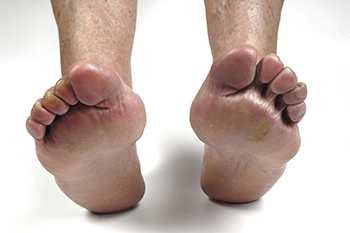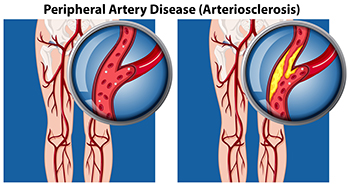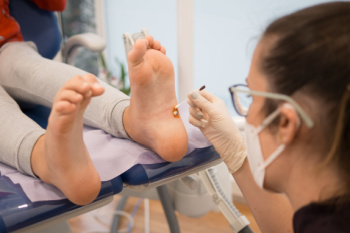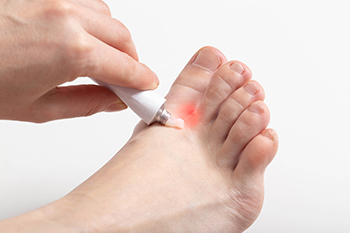Items filtered by date: September 2024
How Rheumatoid Arthritis Affects the Feet

Rheumatoid arthritis, or RA, is an inflammatory condition that commonly affects the joints, including those in the feet. People with RA often experience symptoms such as pain, swelling, and stiffness in the smaller joints of the toes and forefoot. Over time, if not properly managed, this can lead to joint deformities, nodules, and even altered foot shape. Foot issues from rheumatoid arthritis can affect mobility and quality of life, making it harder to perform daily activities. A podiatrist can help alleviate discomfort by prescribing custom orthotics, addressing inflammation, and offering treatments to slow joint damage. They can also address associated skin problems, like corns and calluses, which often develop from pressure points on the feet. Early intervention and continuous care are essential to prevent further complications. If you have foot pain related to rheumatoid arthritis, it is suggested that you make an appointment with a podiatrist for an exam, diagnosis, and treatment options.
Because RA affects more than just your joints, including the joints in your feet and ankles, it is important to seek early diagnosis from your podiatrist if you feel like the pain in your feet might be caused by RA. For more information, contact Evan Young, DPM of Trinity Foot & Ankle . Our doctor will assist you with all of your podiatric concerns.
What Is Rheumatoid Arthritis?
Rheumatoid Arthritis (RA) is an autoimmune disorder in which the body’s own immune system attacks the membranes surrounding the joints. Inflammation of the lining and eventually the destruction of the joint’s cartilage and bone occur, causing severe pain and immobility.
Rheumatoid Arthritis of the Feet
Although RA usually attacks multiple bones and joints throughout the entire body, almost 90 percent of cases result in pain in the foot or ankle area.
Symptoms
- Swelling and pain in the feet
- Stiffness in the feet
- Pain on the ball or sole of feet
- Joint shift and deformation
Diagnosis
Quick diagnosis of RA in the feet is important so that the podiatrist can treat the area effectively. Your doctor will ask you about your medical history, occupation, and lifestyle to determine the origin of the condition. Rheumatoid Factor tests help to determine if someone is affected by the disease.
If you have any questions please feel free to contact our office located in Trinity, FL . We offer the newest diagnostic and treatment technologies for all your foot and ankle needs.
Finding Relief for Peripheral Artery Disease in the Feet

Peripheral artery disease, or PAD, affects blood flow to the extremities, often causing pain, numbness, and discomfort in the feet. To find relief from PAD, managing underlying conditions like diabetes and high blood pressure is essential. Regular exercise, such as walking, can improve circulation and reduce symptoms by encouraging blood flow. Wearing well-fitting, comfortable shoes helps alleviate pressure points and prevent sores. Maintaining a healthy diet and quitting smoking can also significantly benefit vascular health. In more severe cases, medical interventions like angioplasty or surgery might be necessary to restore blood flow. If you have this condition, it is suggested that you are under the care of a podiatrist who can perform regular foot health checks.
Peripheral artery disease can pose a serious risk to your health. It can increase the risk of stroke and heart attack. If you have symptoms of peripheral artery disease, consult with Evan Young, DPM from Trinity Foot & Ankle . Our doctor will assess your condition and provide you with quality foot and ankle treatment.
Peripheral artery disease (PAD) is when arteries are constricted due to plaque (fatty deposits) build-up. This results in less blood flow to the legs and other extremities. The main cause of PAD is atherosclerosis, in which plaque builds up in the arteries.
Symptoms
Symptoms of PAD include:
- Claudication (leg pain from walking)
- Numbness in legs
- Decrease in growth of leg hair and toenails
- Paleness of the skin
- Erectile dysfunction
- Sores and wounds on legs and feet that won’t heal
- Coldness in one leg
It is important to note that a majority of individuals never show any symptoms of PAD.
Diagnosis
While PAD occurs in the legs and arteries, Podiatrists can diagnose PAD. Podiatrists utilize a test called an ankle-brachial index (ABI). An ABI test compares blood pressure in your arm to you ankle to see if any abnormality occurs. Ultrasound and imaging devices may also be used.
Treatment
Fortunately, lifestyle changes such as maintaining a healthy diet, exercising, managing cholesterol and blood sugar levels, and quitting smoking, can all treat PAD. Medications that prevent clots from occurring can be prescribed. Finally, in some cases, surgery may be recommended.
If you have any questions, please feel free to contact our office located in Trinity, FL . We offer the newest diagnostic and treatment technologies for all your foot care needs.
Symptoms and Treatment of Plantar Warts

Plantar warts, caused by the human papillomavirus, or HPV, often develop on the soles of the feet, leading to discomfort, especially while walking. Highly contagious plantar warts typically appear as firm, rough, and flat lesions, often with small black dots at the center. They commonly affect people who use communal showers, pools, or changing areas. While plantar warts can affect anyone, people with a weakened immune system are particularly vulnerable. Diagnosis of plantar warts is generally made through visual examination to differentiate the wart from similar skin conditions, like corns or calluses. Treatment provided by a podiatrist may include cryotherapy, where the wart is frozen off, or the application of topical salicylic acid to dissolve the wart over time. A podiatrist can also offer more advanced options if the wart resists initial treatment. If you have developed a plantar wart, it is suggested that you schedule an appointment with a podiatrist for a diagnosis and treatment.
Plantar warts can be very uncomfortable. If you need your feet checked, contact Evan Young, DPM from Trinity Foot & Ankle . Our doctor will assist you with all of your foot and ankle needs.
About Plantar Warts
Plantar warts are the result of HPV, or human papillomavirus, getting into open wounds on the feet. They are mostly found on the heels or balls of the feet.
While plantar warts are generally harmless, those experiencing excessive pain or those suffering from diabetes or a compromised immune system require immediate medical care. Plantar warts are easily diagnosed, usually through scraping off a bit of rough skin or by getting a biopsy.
Symptoms
- Lesions on the bottom of your feet, usually rough and grainy
- Hard or thick callused spots
- Wart seeds, which are small clotted blood vessels that look like little black spots
- Pain, discomfort, or tenderness of your feet when walking or standing
Treatment
- Freezing
- Electric tool removal
- Laser Treatment
- Topical Creams (prescription only)
- Over-the-counter medications
To help prevent developing plantar warts, avoid walking barefoot over abrasive surfaces that can cause cuts or wounds for HPV to get into. Avoiding direct contact with other warts, as well as not picking or rubbing existing warts, can help prevent the further spread of plantar warts. However, if you think you have developed plantar warts, speak to your podiatrist. He or she can diagnose the warts on your feet and recommend the appropriate treatment options.
If you have any questions please feel free to contact our office located in Trinity, FL . We offer the newest diagnostic and treatment technologies for all your foot and ankle needs.
Facts About Athlete’s Foot

Athlete's foot, medically known as tinea pedis, is a fungal infection that affects the skin on the feet. It commonly manifests in three types, interdigital, moccasin, and vesicular. Interdigital occurs between the toes, moccasin causes scaling on the soles, and vesicular causes fluid-filled blisters. Athlete's foot is caused by fungi that thrive in warm, moist environments, like locker rooms or damp shoes. Symptoms typically include itching, redness, and peeling of the skin, often accompanied by a burning sensation. The infection can spread to other areas of the body if not treated promptly. Maintaining good foot hygiene, keeping feet dry, and wearing breathable footwear can help prevent athlete's foot. If you have an athlete’s foot infection, it is suggested that you promptly visit a podiatrist who can effectively treat this highly contagious condition.
Athlete’s foot is an inconvenient condition that can be easily reduced with the proper treatment. If you have any concerns about your feet and ankles, contact Evan Young, DPM from Trinity Foot & Ankle . Our doctor will treat your foot and ankle needs.
Athlete’s Foot: The Sole Story
Athlete's foot, also known as tinea pedis, can be an extremely contagious foot infection. It is commonly contracted in public changing areas and bathrooms, dormitory style living quarters, around locker rooms and public swimming pools, or anywhere your feet often come into contact with other people.
Solutions to Combat Athlete’s Foot
- Hydrate your feet by using lotion
- Exfoliate
- Buff off nails
- Use of anti-fungal products
- Examine your feet and visit your doctor if any suspicious blisters or cuts develop
Athlete’s foot can cause many irritating symptoms such as dry and flaking skin, itching, and redness. Some more severe symptoms can include bleeding and cracked skin, intense itching and burning, and even pain when walking. In the worst cases, Athlete’s foot can cause blistering as well. Speak to your podiatrist for a better understanding of the different causes of Athlete’s foot, as well as help in determining which treatment options are best for you.
If you have any questions please feel free to contact our office located in Trinity, FL . We offer the newest diagnostic and treatment technologies for all your foot and ankle needs.
